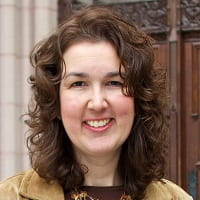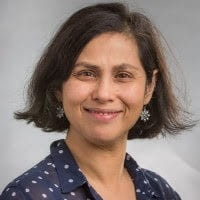Chelsea Yates
SPARC sets the course for space research and policy partnerships in the Pacific Northwest.

With all the global challenges we face here on Earth, why invest time, energy and money in space?
“I would say look around you. A good part of your way of living is somehow, somewhere, running in and through space,” says Saadia Pekkanen, the Job and Gertrud Tamaki Endowed Professor in the Henry M. Jackson School of International Studies. “Thanks to space research advancements, we are building an ever more precise understanding of life on Earth — environmental, economic and political.”
“So many technologies designed for space — new materials, data connectivity, satellite networks, accountable energy use and much more — have huge implications for many of the societal problems we face on this planet,” adds Kristi Morgansen, professor and chair of the William E. Boeing Department of Aeronautics & Astronautics. “When done with the greater good in mind, investing in space can truly advance a more just world.”
What is the relationship between space policy, research and innovation? How can we advance space efforts for social good?
On this planet, it’s an interesting time for space research. Today, more and more emerging commercial entities and private ventures are entering the “new space race” to propel space technology, taking the reins from government agencies and established aerospace companies that have traditionally led these efforts. This brings up questions of equity, power, ethics and privilege. How can industry, governments and academic institutions work together to unpack the challenges of human presence and endeavors in space? What is the relationship between space policy, research and innovation? How can we advance space efforts for social good?
At the UW, Morgansen and Pekkanen co-direct the Space Policy and Research Center (SPARC), which they launched in 2018 to bring together researchers, policymakers and industry professionals to explore these questions and more.
A need for collaboration
SPARC’s efforts on campus extend across an array of academic disciplines: engineering, law, global studies, business, astrobiology, computer science, environmental science, medicine and math, to name a few. The complexity of space challenges deepens the need for cross-disciplinary collaboration.

Kristi Morgansen, Co-Director, SPARC
“The different parts of the problems that need to be solved touch on so many different disciplines, and we need to make sure all voices are represented,” Morgansen says. “After all, research has shown that the more diverse a group of people you have working on a problem, the better the outcome will be.”
In addition to connecting academic researchers with each other, SPARC builds bridges for them to work with policymakers and industry professionals.
“All issues related to outer space activities crisscross technology, law and policy, and more so today because space is democratized in unprecedented ways,” Pekkanen explains.
In particular, she and Morgansen believe that universities are uniquely positioned to play a significant role in working across governments in competition with one another to be a global space leader as well as by helping private companies connect with each other.
To move forward it’s important that private companies engage not just with academic researchers but with those government entities and established, well-known companies that laid the groundwork for technology advancements.”
“It’s a different landscape today than even just 20 years ago,” says Morgansen. “To move forward it’s important that private companies engage not just with academic researchers but with those government entities and established, well-known companies that laid the groundwork for technology advancements. SPARC provides the platform for these exchanges to take place.”
At home in the Pacific Northwest
According to the directors, having SPARC situated at the UW and in the Pacific Northwest is critical.
“In addition to being home to a top engineering program with advances in space systems, computer science and data science and at the forefront of space policy and law, the UW has leading faculty and researchers in physics, math, environment and life sciences who contribute to our understanding of the universe and our potential reach in space,” they say.
The region is home to spacecraft and aerospace companies and is powering new technologies, from reusable rocketry and satellite manufacturing to innovative systems for communications, deployment and mission management. The aerospace industry alone provides jobs for tens of thousands in Washington.
Academia can help address workforce development needs and employee training for the Pacific Northwest. SPARC is in the early stages of developing professional education and training programs, and the directors look forward to building these out in partnership with regional organizations such as the Pacific Northwest National Laboratory. Such opportunities could include collaborative research and knowledge dissemination, joint publication, student internships, short courses, tutorials and other forms of continuing education.
Looking into the future
SPARC hopes to position itself as the premier go-to resource for innovative space technology and policy. Each autumn since it launched, the center hosts an annual space symposium, convening approximately 450 people every year to discuss topics ranging from autonomous operations and security to sustainable built environments and workforce development. For students, the directors envision an interdisciplinary space studies curriculum in technology, law and policy, bringing together STEM, social sciences and humanities in the common enterprise of preserving peaceful prospects in space.

Saadia Pekkanen, Co-Director, SPARC
They’re also connecting SPARC to the Institute for Space Law, Data and Policy (SDLP) that Pekkanen is developing with support from the UW School of Law. SDLP is the world’s first interdisciplinary institute focused on space law, data and policy in a global context and will be a dedicated platform for education, training and public outreach.
To effectively work with organizations ranging from academic institutions, non-profits, government agencies and commercial entities, the directors say it’s key to start with a network of partners with shared values.
“The most important thing is to work with people who share your belief that educating the next generation of space professionals requires collaboration. We have really found that to be true at the UW,” Pekkanen says. “Thanks to our colleagues, we have built up a technology and policy platform through SPARC that we think can be a useful interdisciplinary model for academia.”
Originally published February 14, 2022